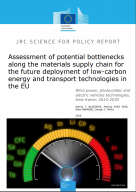Details
- Publication date
- 1 January 2016
- Author
- Joint Research Centre
Description
The ambitious EU policy to reduce greenhouse gas emissions in combination with a significant adoption of low-carbon energy and transport technologies will lead to strong growth in the demand for certain raw materials. This report addresses the EU resilience in view of supply of the key materials required for the large deployment of selected low-carbon technologies, namely wind, photovoltaic and electric vehicles. A comprehensive methodology based on various indicators is used to determine the EU’s resilience to supply bottlenecks along the complete supply chain – from raw materials to final components manufacturing.
The results revealed that, in 2015, the EU had low resilience to supply bottlenecks for dysprosium, neodymium, praseodymium and graphite, medium resilience to supply of indium, silver, silicon, cobalt and lithium and high resilience to supply of carbon fibre composites. In the worst case scenario where no mitigation measures are adopted, the materials list with supply issues will grow until 2030. Indium, silver, cobalt and lithium will add up to the 2015 list.
However, the probability of material supply shortages for these three low-carbon technologies might diminish by 2030 as a result of mitigation measures considered in the present analysis, i.e. increasing the EU raw materials production, adoption of recycling and substitution. In such optimistic conditions, most of the materials investigated are rated as medium or high resilience. The exceptions are neodymium and praseodymium in electric vehicles, for which the EU resilience will remain low.

